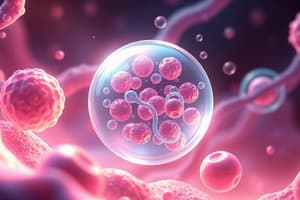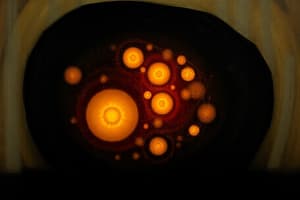Podcast
Questions and Answers
What is the primary function of mitochondria in eukaryotic cells?
What is the primary function of mitochondria in eukaryotic cells?
- Transport materials within the cell
- Provide energy through aerobic respiration (correct)
- Synthesize proteins
- Store genetic information
Where are ribosomes primarily located in eukaryotic cells?
Where are ribosomes primarily located in eukaryotic cells?
- Within vesicles only
- Free in the cytoplasm or attached to the rough endoplasmic reticulum (correct)
- On the surface of the smooth endoplasmic reticulum
- Inside the mitochondria
Which organelle is primarily involved in packaging and transporting proteins?
Which organelle is primarily involved in packaging and transporting proteins?
- Nucleus
- Ribosomes
- Mitochondria
- Vesicles (correct)
What characteristic distinguishes rough endoplasmic reticulum from smooth endoplasmic reticulum?
What characteristic distinguishes rough endoplasmic reticulum from smooth endoplasmic reticulum?
What is the size range of mitochondria in eukaryotic cells?
What is the size range of mitochondria in eukaryotic cells?
Which of the following statements about vesicles is incorrect?
Which of the following statements about vesicles is incorrect?
Cells that produce large amounts of proteins, such as digestive enzymes, are likely to have extensive:
Cells that produce large amounts of proteins, such as digestive enzymes, are likely to have extensive:
In what cellular structure does aerobic respiration primarily occur?
In what cellular structure does aerobic respiration primarily occur?
Flashcards
Mitochondria
Mitochondria
Large organelles found in eukaryotic cells, visible under an electron microscope (1-5 µm long). They have a double membrane, with an outer membrane controlling material entry and exit, and an inner membrane folded into cristae where aerobic respiration takes place.
Ribosomes
Ribosomes
Small organelles (20 nm) present in large numbers in eukaryotic cells. They are responsible for synthesizing proteins, especially enzymes needed for respiration.
Endoplasmic Reticulum (ER)
Endoplasmic Reticulum (ER)
A network of flattened sacs surrounded by membranes and filled with fluid. It plays a vital role in protein synthesis and transport within the cell.
Rough Endoplasmic Reticulum (RER)
Rough Endoplasmic Reticulum (RER)
Signup and view all the flashcards
Vesicles
Vesicles
Signup and view all the flashcards
Aerobic Respiration
Aerobic Respiration
Signup and view all the flashcards
Cytoplasm
Cytoplasm
Signup and view all the flashcards
Calculating Magnification and Actual Size
Calculating Magnification and Actual Size
Signup and view all the flashcards
Study Notes
Cell Organelles
- Organelles are small structures within cells, including mitochondria, ribosomes, and vesicles.
Mitochondria
- Definition: Large organelles (1 µm to 5 µm in length) visible under an electron microscope, found in eukaryotic cells.
- Structure:
- Double membrane:
- Outer membrane controls material entry/exit.
- Inner membrane folds into cristae, where aerobic respiration occurs.
- Double membrane:
- Function: Site of aerobic respiration, providing energy for the cell.
- Note: Cells with high respiration rates (e.g., liver, muscle cells) contain many mitochondria.
Ribosomes
- Definition: Small organelles (20 nm in size), numerous in eukaryotic cells; smaller in prokaryotic cells.
- Function: Synthesize proteins, particularly enzymes used in respiration.
- Location: Attached to the rough endoplasmic reticulum (RER) or free in the cytoplasm.
Endoplasmic Reticulum (ER)
- Definition: A complex system of flattened sacs surrounded by membranes and filled with fluid.
- Types:
- Rough Endoplasmic Reticulum (RER):
- Has ribosomes on its surface.
- Function: Packages and transports proteins synthesized by ribosomes (e.g., digestive enzymes).
- Rough Endoplasmic Reticulum (RER):
- Vesicles
- Definition: Small pieces of RER pinched off, forming sacs.
- Function: Transport materials within the cell by merging with the cell membrane and releasing contents outside the cell.
Studying That Suits You
Use AI to generate personalized quizzes and flashcards to suit your learning preferences.




